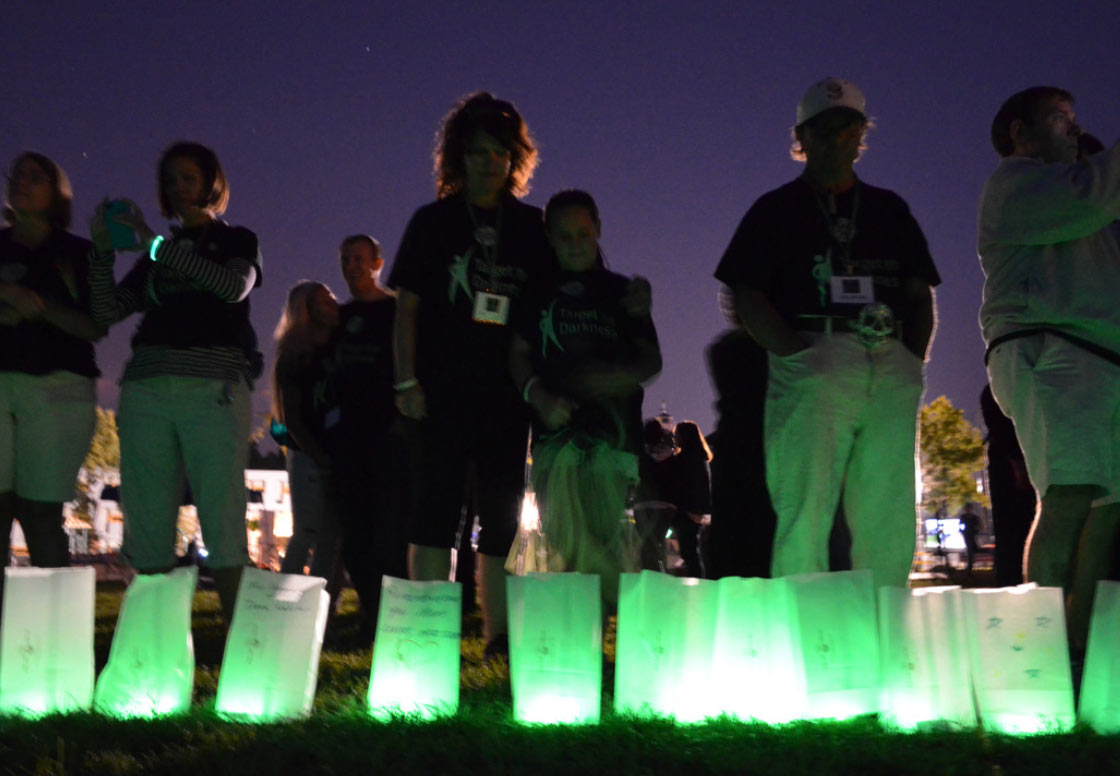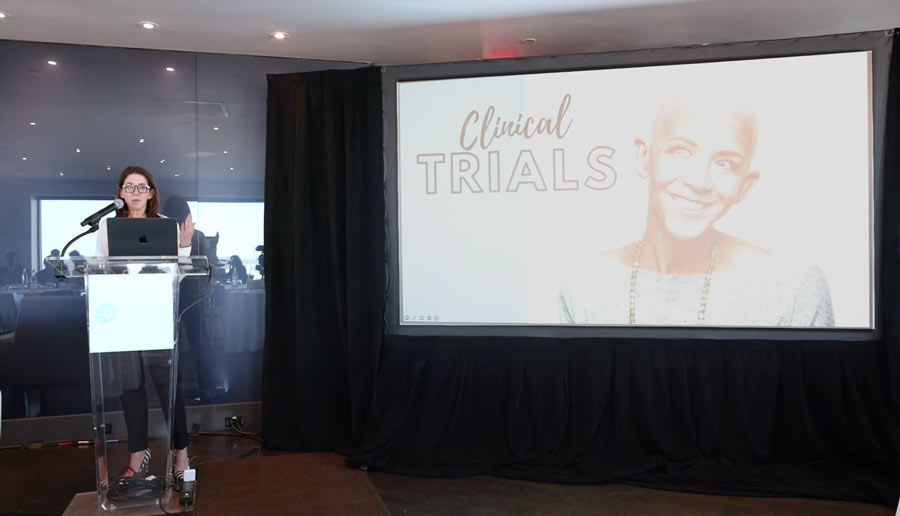You are not alone.
Finding out you have cancer is terrifying. Learning that your cancer is rare and that treatment options are limited adds another level of anxiety. Despite how isolating it may feel, you are not alone, and there are options. TargetCancer Foundation is here to help.
If you or a loved one is diagnosed with a rare cancer, deciding what to do next can be overwhelming. Fortunately, there are more rare cancer treatment and care options today than ever before.

The content on this page is not meant to substitute for professional medical advice or treatment. It is designed for informational purposes only. Consulting directly with your care team is the best way to get personalized treatment recommendations.
Steps to Guide You Through a Rare Cancer Diagnosis
Watch Our Initial Steps Webinar
1
Get biomarker testing for your rare tumor.
Genomics is transforming how rare cancers are studied, diagnosed, and treated. All cancers contain changes in the cancer cells which are otherwise known as DNA alterations or mutations. These mutations cause cancer cells to grow and spread, developing into a tumor. Comprehensive biomarker testing — sometimes called genomic testing or genomic profiling — finds these mutations by analyzing your tumor tissue or blood. This testing can help you learn about the alterations that are unique to your tumor and help you and your care team better identify treatments specifically designed to target them.

Biomarker testing is a critical first step in creating a treatment plan for any rare cancer. This testing can be repeated at different points in a patient’s treatment. Ask your doctor if biomarker testing is going to be performed on your tumor tissue or blood through your routine care. If not, ask your doctor about options for this testing through companies, such as Foundation Medicine, Tempus, or Caris. The availability of biomarker testing and targeted cancer treatments continues to expand, as does the possibility of insurance coverage for both testing and treatments.

Explore the TCF-001 TRACK Clinical Trial
Individuals who enroll in the TCF-001 TRACK clinical trial will receive biomarker testing of their tumor tissue and blood at no cost.
Additional Resources on Biomarker Testing
- Genetics vs. Genomics Fact Sheet (National Human Genome Research Institute)
- Cancer Genomics (National Human Genome Research Institute)
- What is Genomic Testing? (Dana-Farber Cancer Institute)
2
Seek a second opinion.
Benefits of Multidisciplinary Care Teams
It is always wise to get a second opinion on how to treat your cancer. When a tumor is rare, it can be more challenging to diagnose and more easily misdiagnosed. Many doctors who work in smaller offices may have never seen or treated certain rare tumors. Before starting treatment, it is important to have confidence that your diagnosis is accurate and that your care and treatment are being delivered by a physician specializing in your type of rare cancer — ideally from a:
- Cancer center associated with a university or medical school
- NCI-designated center
- Clinic focused on rare cancers

While it is ideal to seek a second opinion as early as possible, this can also happen at different times during one’s treatment, especially when considering a new treatment strategy.
The care team you choose matters, and the most effective care teams involve multiple specialists from different disciplines who work together to manage your care in a coordinated way, also known as a multi-disciplinary care team. These multidisciplinary teams can be found at academic medical centers, where the most advanced and current research usually takes place. It is important to find a team that you feel comfortable with, and with whom you can ask questions and have challenging conversations.
Why A Second Opinion is Important for Rare Cancers
A second opinion is particularly important in rare cancers because only a few oncologists may have experience in dealing with your type of rare cancer. Don’t worry about offending your current doctor by seeking advice from another medical professional. Most doctors understand and encourage their patients to get more than one opinion. Whether it confirms your initial diagnosis and treatment plan or offers a different perspective, a second opinion can inform and expand your treatment options, giving you the information needed to make the best possible care decision.
There are several ways to find doctors who can offer a second opinion.
Ask for referrals from your current doctor, and be open and honest about the reasons for the request.
In the United States, find a reputable academic research institution or hospital designated as a Cancer Center or Comprehensive Cancer Center by the National Cancer Institute and request a referral from there.
Contact a patient advocacy foundation that specializes in the cancer for which you have been diagnosed and ask for a referral to a known specialist in that field.
Ask your insurance carrier about their coverage policies for seeking a second opinion either in or out of network.
Questions you may want to ask your doctor:
- How often have you seen this exact diagnosis?
- How many people have you treated with it?
- How experienced is the rest of your team with my type of cancer?
- What new treatment options and clinical trials are available?
- Are you open to collaborating with me if I find relevant information on my rare cancer?
- When I am in between appointments or if I have symptoms, how can I expect to communicate with you?
Additional resources on getting a second opinion:
- Seeking a Second Opinion (American Cancer Society)
- Why Get a Second Opinion? (City of Hope)
- When to Get a Second Opinion (CancerCare.org)
- Questions to Ask Your Doctor about Cancer (National Institutes of Health)
3
Connect with an advocacy foundation that specializes in your type of cancer.
Once your diagnosis is confirmed, a good way to find trustworthy information and community support is to search for patient advocacy and research foundations that specialize in your type of cancer. These groups — many founded by individuals and families with their own personal rare cancer experience — help connect patients and caregivers to education, research, other patients and families, and support services. Disease-specific foundations are also playing increasingly active and important roles in funding and carrying out innovative research and clinical trials, creating the infrastructure to advance medical research, and driving investment into rare cancer therapy development. They are a great place to start researching doctors, treatments, and community services that may be right for you and your loved ones.

Contact us for guidance on finding rare cancer advocacy foundations.
4
Create a treatment roadmap.
Before starting treatment, it is important to talk to your medical team about treatment goals. These conversations can include the impact of different treatment schedules on everyday life, the management of symptoms and side effects, and more.
Talk to your doctor about which treatment options are best for you and understand that it may be necessary to identify alternate plans for future treatments. Many rare cancers do not have a standard of care or a treatment protocol that experts agree on or guidelines show is the most appropriate and/or effective for a specific type and stage of cancer. Because of this, the treatment options available to you will depend on several factors, including:
- Where your tumor is located
- The results of your biomarker testing
- Your age and overall health
- The stage (extent) of the cancer
Consider a rare cancer clinical trial.
Much of what scientists have learned about cancer treatment has come from patients sharing their experiences and tissue through a clinical trial. While some cancers have approved therapies and standards of care, many rare cancers rely on clinical trials as a first line of treatment. A clinical trial is often one of the best ways to access new or experimental therapies or connect with doctors who are experts in your rare cancer. Ask your doctor about the types of clinical trials available to you when building a treatment roadmap.
3Rare Cancers. Cancer Research UK.
Watch: Clearing the Air About Clinical Trials Webinar
Know your treatment options.
- surgery
- chemotherapy
- radiotherapy
- hormone therapy
- targeted treatments
- immunotherapy
You may need more than one of these types of treatments, and it helps to put multiple potential plans in place in case you need to shift gears after treatment has begun. Ask your care team about the side effects you can expect with each type of treatment and how they might affect your quality of life. You should also feel comfortable asking questions about the scientific data and the safety and effectiveness for each type of treatment.
Additional Resources for Navigating a New Diagnosis
- After Diagnosis: A Guide for Patients and Families (American Cancer Society)
- HelpBook: What to Do If Cancer Strikes: An Eight-Step Guide for Cancer Patients on How to Get the Best Care (Cancer Research Institute)
- Diagnosed With a Rare Cancer: Now What (MD Anderson Cancer Center)
- Programs and Resources to Help With Cancer-related Expenses (American Cancer Society)
- Coping With Cancer (National Cancer Institute)
- Build a Helping Network Among Your Friends and Family (Cancer Support Community)


